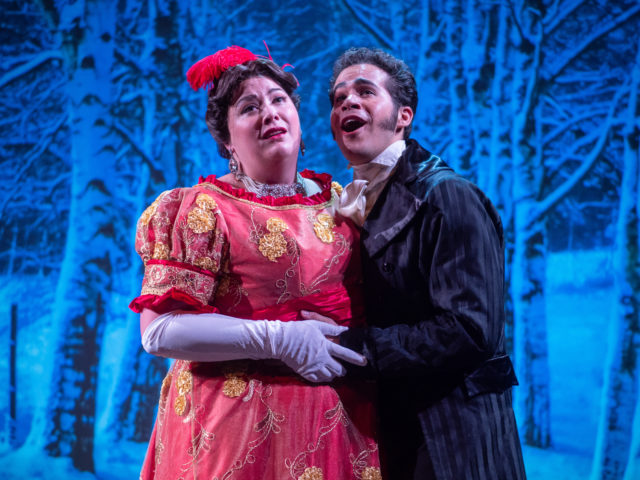
The University of Colorado Eklund Opera Program is doing something it has never done before: performing a full opera in Russian, with English surtitles.
The opera is Tchaikovsky’s Eugene Onegin, one of the most well-known and popular Russian operas, in and outside of Russia. The cast of CU students will be directed by Leigh Holman, director of the Eklund Opera Program, and conducted by Nicholas Carthy, the program’s music director.
Eugene Onegin is about the unrequited love between Onegin, a bored ne’er-do-well aristocrat, and Tatyana, a naive country girl whose sister is engaged to Onegin’s friend, Lensky. Tatyana impulsively writes a letter declaring her love to Onegin, who brushes her aside.
Soon after, Onegin kills Lensky in an impetuous duel that neither man wants, and then wanders the world for several years in despair. Returning to St. Petersburg, he realizes he is in love with Tatyana, now married to an older nobleman. When he declares his love, Onegin finds the shoe is on the other foot, as Tatyana turns him aside out of loyalty to her husband.
Carthy has wanted to conduct Eugene Onegin since he coached singers in a production at the Salzburg Festival 30 year ago. “I thought, ‘I really need to do this,’ and I’ve been waiting ever since,” he says.
Because it requires bigger voices, Onegin is not an opera that a university company can always perform. This year, the stars aligned and the singers were available for Onegin at CU. Holman called Carthy while he was on sabbatical last year to say she thought this would be the year.
“We’re just excited to have the big voices now that can do [Onegin],“ she says.
“It ticks all the boxes,” Carthy says. “It’s the most wonderfully Romantic piece. The orchestra [members] are in heaven with the rehearsals — it’s music that appeals. Educationally, it’s a stretch, singing in Russian for the first time. [Russian opera] is a fantastic genre, and for [the students] to be able to say, ‘We’ve done an opera in Russian!’”
The singers are learning the Russian phonetically and being coached in Russian diction by visiting experts. But the language is not the only challenge: The opera is based on a novel in verse by Alexander Pushkin that is beloved and revered in Russia, and known to almost every Russian.
Tchaikovsky set only four scenes from the full story from the novel, and called his score not an opera, but “lyric scenes in three acts.” Of all Russian operas, “It’s the one with the least dramatic continuum,” Carthy says.
The missing scenes are so familiar to Russian audiences that they easily fill in the gaps. But for young American singers, those gaps are less easily filled. “We’ve worked in depth on those scenes that were left out in the opera,” Holman says. “First of all, all of the singers have read the novel.
“We’ve worked on the wandering, before Onegin comes back to St. Petersburg (covered in the novel but omitted in the opera). We talked about what he might have experienced, the remorse he feels for killing Lensky, and how unfulfilled he feels as a human being.”
That kind of background “is part of an opera singer’s education,” Carthy says, “not just that you have this fabulous voice. Nowadays, the literary background of what you do becomes evermore important.”
For this opera, Onegin is the key character. He is both the protagonist and the villain who causes all of the dramatic events that take place. “He causes mayhem to happen,” Carthy says. “In the first act Onegin destroys Tatyana, in the second act Onegin destroys Lensky, and in the third act Tatyana destroys Onegin.”
Nevertheless, he is a character we can relate to. Holman describes him as “a 25-year-old guy who really doesn’t know what love is … and with no idea of the consequences that his actions have,” Carthy adds. And part of the power of the opera is that these are basic human experiences that are still familiar.
“The human emotions are both universal and eternal,” Carthy says. “What they feel, we feel, what they do, we do. We don’t die in duels, but we do humiliate people, we do destroy people, and we do get destroyed. And the music speaks very, very directly to emotions that we all know.”
Learning their parts in Russian, studying the literary source, exploring their characters, and rehearsing a large and complex opera is a lot of work for the cast. “It takes an awful amount of effort, an awful amount of work,” Carthy says.
“My goodness, but the rewards!”
ON THE BILL: ‘Eugene Onegin’ by Tchaikovsky. CU Eklund Opera Program. 7:30 p.m. March 15-16. 2 p.m. March 17, Macky Auditorium, 1591 Pleasant St., Boulder, 303-492-8008. Tickets: cupresents.org/event/1609/cu-opera/eugene-onegin














